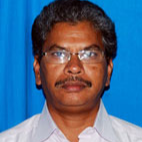
K. Chandrasekaran
Work place: Department of Computer Science and Engineering, National Institute of Technology Karnataka Surathkal, Karnataka, India
E-mail: kchnitk@gmail.com
Website:
Research Interests: Computer systems and computational processes, Computer Architecture and Organization, Computer Networks, Information Security, Information Systems
Biography
K. ChandraSekaran is currently Professor in the Department of Computer Science and Engineering, National Institute of Technology Karnataka, having 26 years of experience. He has morethan 120 research papers published in various reputed International journals, con ferences which include IEEE, ACM, Springer etc. He has received best paper awards and best teacher awards. He serves as a member of various reputed societies, including IEEE (Senior member), ACM (Senior Member), CSI, ISTE and Association of British Scholars (ABS). He is also a member in IEEE Computer Society’s Cloud Computing STC (Special Technical Community). His areas of interest include Computer Networks, Distributed Computing (includes Cloud Computing and Security) and Business Computing and Information Systems Management.
Author Articles
Secure Allocation of Resources in Cloud Using Trust
By Usha Divakarla K. Chandrasekaran
DOI: https://doi.org/10.5815/ijcnis.2016.01.06, Pub. Date: 8 Jan. 2016
Cloud is the recent emerging technology in all aspects. The basic concern with the usage of this Cloud Technology is security. Security poses a major drawback with data storage, resource utilization, virtualization, etc. In the highly competitive environment the assurances are insufficient for the customers to identify the trust worthy cloud service providers. As a result all the entities in cloud and cloud computing environment should be trusted by each other and the entities that have communication should have valid trust on each other. Trust being the profound component in any network has attracted many researchers for research in various ways. The models developed so far are platform dependent and are not valid for heterogeneous platforms. An efficient model which can be ported on any platform is the current research trend in the research world. Our model is platform independent and also helps in calculating trust while migrating to another platform. The result shows that the proposed model is much more efficient in terms of computation time.
[...] Read more.Single Sign-On in Cloud Federation using CloudSim
By Manoj V. Thomas Anand Dhole K. Chandrasekaran
DOI: https://doi.org/10.5815/ijcnis.2015.06.06, Pub. Date: 8 May 2015
Single Sign-On (SSO) is an authentication mechanism in which a Cloud Service Consumer (CSC) needs to be authenticated only once while accessing vari-ous services from multiple service providers, or when accessing multiple services from the same service provid-er. In the case of Cloud Federation, the consumers can get services from various Cloud Service Providers (CSPs) who are members of the federation, and SSO can be used to verify the legitimate users without requiring them to get authenticated with each service provider separately. CloudSim is a popular tool used for simulating various cloud computing scenarios. As of now, the simulator lacks effective user authentication and authorization methods with it. In this paper, we discuss the design and implementation of SSO mechanism in the Cloud Federa-tion scenario using the CloudSim toolkit. We have used the Fully Hashed Menezes-Qu-Vanstone (FHMQV) pro-tocol for the key exchange and the Symmetric Key En-cryption technique AES-128 for encrypting the identity tokens. We give the workflow model for the proposed approach of SSO in the Cloud Federation and also, the execution time taken in the simulation for various Single Sign-On scenarios where the number of SSO required varies are also shown.
[...] Read more.Other Articles
Subscribe to receive issue release notifications and newsletters from MECS Press journals